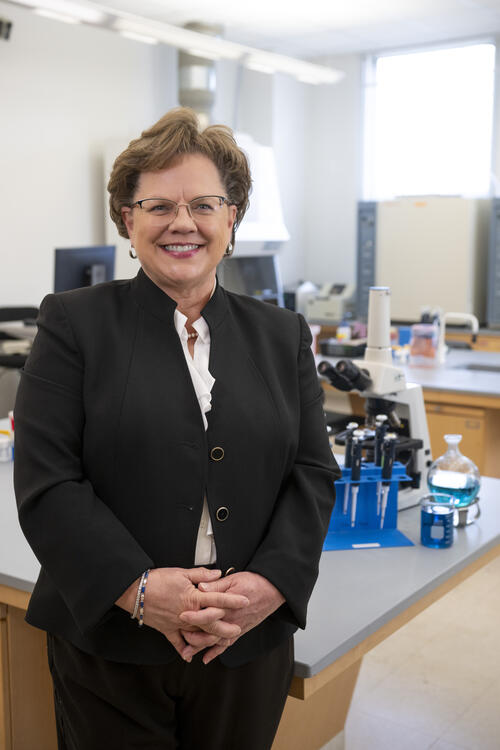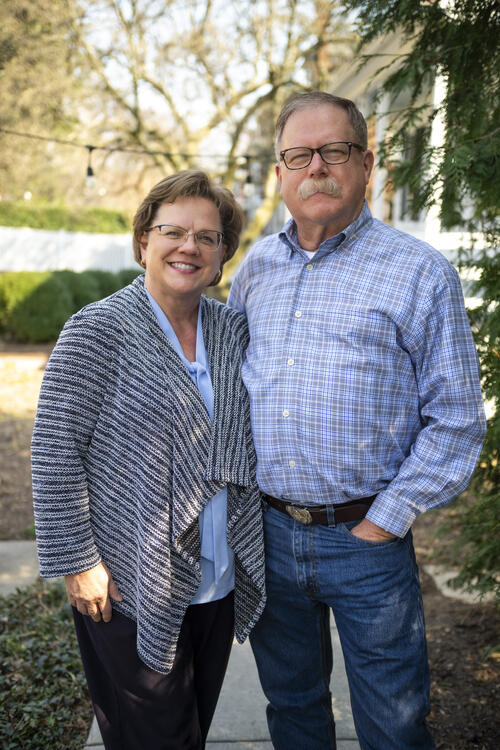Presidential Biography
“I’m excited to build upon Hood’s success and continue to champion the outstanding accomplishments of our faculty, staff and students while advancing our mission and strategic goals.”
The leadership of Hood College, whether it be the Board of Trustees, Board of Associates or senior leadership team, shares the president’s commitment to our students and their success.
Debbie Ricker, Ph.D., became Hood College’s president on April 1, 2025, after serving as interim president since July 1, 2024.
Biography
Debbie Ricker, Ph.D., began as Hood College’s provost and vice president of academic affairs on July 1, 2016, following a long career at York College of Pennsylvania, having served as a faculty member and department chair for the biological sciences department, associate dean of academic affairs and the founding dean of the Division of Academic Services.
A champion of Hood’s core values of Hope, Opportunity, Obligation and Democracy, Ricker spearheaded the development of new undergraduate programs in public health, sustainability studies, art therapy and finance. Ricker was also instrumental in launching Hood’s highly successful graduate cybersecurity program. She oversaw all student retention efforts, including the formation of Hood’s Office of Student Success, which helps students of all class levels achieve their academic goals via mentorship, tutoring and advising. Ricker’s efforts resulted in record-setting first-year retention and graduation rates. Ricker also led Hood’s High Impact Practice Task Force, which aimed to ensure that every Hood student has at least one experiential learning opportunity before graduating.
Ricker earned a Ph.D. from The Johns Hopkins University, a master’s degree in biology from East Tennessee State University and a bachelor’s degree in biology from Mars Hill University. Ricker also attended the Institute for Educational Management at Harvard University, as well as the Council of Independent Colleges Executive Leadership Academy.
Chris Cunningham recently retired as the senior mission planner and national program manager for the Federal Bureau of Investigation’s Laboratory Division-Forensic Response Section, where he oversaw national-level and sensitive crime scene and forensic operations, as well as the training, and policy development that enabled those operations. Additionally, Mr. Cunningham provided liaison to US Federal, State, Local, Territorial, and Tribal, and allied nation law enforcement, intelligence, and military partner agencies.
Chris entered federal service in January 1983 as a Submarine Sonarman and served on board nuclear fast-attack submarines; later transitioning to deep-sea diving, search & salvage, and special operations commands. In the late ‘90s, he worked for the US Navy’s Supervisor of Salvage and Diving performing deep sea search and recovery work around the world. Some of those operations included TWA Flt 800, Air Tran Flt 592, Birgen Airways Flt 301, recovery of the crew remains of the M/V Mineral Dampier, and many other items of national and international significance.
After graduating from York College of Pennsylvania, he returned to federal service at Aberdeen Proving Grounds near Gunpowder, Md in early 2002 where he taught environmental sampling/monitoring, instrumental chemistry, statistical analysis, and chemistry laboratory safety as those subjects related to the chemical warfare agent recovery, monitoring, and analysis performed by then the US Army, 22d Chemical Battalion-Technical Escort Unit and the US Army’s Chemical Materials Agency. He then transitioned to the 20th Support Command (Chemical, Biological, Radiological, Nuclear, and Explosives) (CBRNE). During this period, he was instrumental in the development, validation, hardening, and deployment of many significant counter improvised explosive device and expeditionary forensic laboratory capabilities. He also satisfied the short-notice scientific and technical requirements of the Explosive Ordnance Disposal (EOD), CBRN, and special operations communities during counterterrorism and ground combat operations. Mr. Cunningham also performed the manning, equipping, training and readiness oversight of select Army EOD and CBRN companies in support of classified nationally significant operations. He was also responsible for scientific and technical capability development with similar forces and agencies of the United Kingdom, Australia, New Zealand, Canada, and France.
Chris’ life partner, Dr. Debbie Ricker is the President of Hood College in Frederick Md. Their son is a US Army combat veteran currently employed by Ciocca Corp and the Maryland Army National Guard. Their daughter is a Neonatal Critical Care Nurse at Children’s Hospital of Philadelphia, and completing studies as a Pediatric Nurse Practitioner -Anesthesia at Villanova University.
Are you ready to say Hello?
Choose a Pathway
Information will vary based on program level. Select a path to find the information you're looking for!


